QuestionHello Adrienne,
Short history before the problem- My husband got a Jack Russel before we met. He never worked with the dog, but when I came along I potty trained, leash trained taught some random tricks and socialized him.
After we were married I adopted a terrier from the humane society. She is a mutt, about twice the size of the Jack Russel (NO clue what she is). For three years they have gotten along great, and also with a cat ) and child along the way.
In the past couple months, the dogs have begun fighting. Nothing has changed in our home life. The Jack Russel is about 7 years and the other is 4 years old. They fight at meals (so I have split them into 2 different rooms), when we first get home and they are excited, and at random times outside in the yard together.
I'm a little at my wits end. The mutt is (was) the sweetest dog, but she is the one fighting and now injuring the Jack Russel. We walk and play fetch with the Jack Russel, but the mutt does not get as much exercise. She is terrified of cars, so it makes it hard to walk her. She also doesn't understand games in the back yard. They used to race around together (big fenced in backyard), but now it just ends in fighting.
I'm looking for things I can do at home, as I love to spend time with them, but I am losing my job in 2 weeks, and it will take all that I can just to afford vet costs and everyday care. My biggest fear is having to re-home her. Any advice would be great.
Thank you
AnswerGreetings, and thank you for contacting All Experts!
It is difficult to assess exactly what may be happening in a pack dynamic without seeing the behavior take place. While there may appear to not be any changes in the lives of these dogs, at times, things imperceptible to us may take place. For this reason, I would recommend a dog behaviorist so he or she may assess the situation and provide the most appropriate treatment plan custom tailored to your situation. Therefore, I can really only make some assumptions.
A common cause of fighting among younger dogs and older dogs is that younger dogs may at times start perceiving that the health status of the older dog may be starting to decline a bit and may feel the need to take over higher rank status, if your older dog was the one in charge. This may not be evident to human eyes, but your younger dog may simply perceive your Jack Russel is becoming slightly more frail and vulnerable. As humans, we may not be perceiving these changes but dogs do. It may be anything; from getting older or being affected from some health disorder we may not be aware of.
If this is the case, and the older dog will not relinquish the dominant role even though it cannot physically compete with the younger dog, nasty fights may take place at time. In dogs, generally you start seeing fights when two dogs are close in rank, and they are fighting over for the top position. When you have an assertive dog and a submissive dog that accepts the assertive dog's top position, you hardly have any problems. Problems start when the rank position is almost the same or a previously submissive dog becomes a high rank ''wannabee'' and feels the need to step up to change things around. Again, this is only an assumption. It is worth to have both dogs see a vet just to rule out any medical problems that may at time be cause for aggressive behaviors (ie hypotyroidism)
You really need to carefully watch if there is a pattern when these fights take place. Many fights tend to occur in the presence of the owner. For instance, if your Jack Russell has been always in charge and the mutt wants to take over, a fight may likely occur if you pet first, feed first, or give attention first to the Jack Russell.
As much as we would love to treat our dogs equally, dogs do not live in a democratic world. Dogs do better if you recognize the dog with the higher rank status and feed him first, give him attention first, and give access to resources first. If you try to feed first, give attention first to the more submissive dog a fight will likely ensue because the more assertive dog must ''correct'' the submissive one. The more assertive dog will therefore fight as to say ''How dare you do that, I am the one in charge here''. So watch your dogs carefully, if you notice they fight mostly in your presence, it could likely be because you are unknowingly not following their rank order when petting, feeding or giving attention in general. So let's say a fight occurs after you pet your Jack Russell, you know that your mutt is upset about that and things may need changed around a bit. Again, a dog behaviorist is best since he or she will help you figure out who is exactly in charge, since things may be a bit blurred now as they seem to both want to be in charge.
Now, you say they fight mostly during meal time, and this may be indicative of rank issues. Your really need to manage their feeding times as much as you can. If possible, feed in different rooms with lots of space between them. They should not be fed close to each other. There may be one of the two dogs that after eating wants to try to get to the other's food bowl, this is not tolerated by most dogs and fights may ensue. Try to figure out who is being the instigator, usually it is the dog finishing eating first bit not always the case. You need to put a stop to this by asking the aggressor dog to lay down and stay in its room until the other dog is done eating and you have removed the food dishes. (You must keep an eye open though as they may fight over who gets to sniff and look for left over crumbles). If you are unable to have this level of control, you are better off playing it safe and crating them or feeding them in separate rooms with doors closed.
You mention they fight in the back yard. Generally, the more assertive dog is the one that should be let out first to check the environment, so this already may cause a fight if they are both fighting over who must do this first. Another big trigger is barking at things out of the fence. When two dogs get very aroused in barking at something over the fence, they can manifest re-directed aggression and fight against each other. If this is the case, you should send them out one by one, letting out the most assertive dog first.
When you come home you should not be greeting any of the dogs. You should get inside, ignore the dogs totally and go on with your business. Dogs fight when owners come home over who gets attention first and because they are excited. Make your returns very low key, no looking at them, talking to them, nothing. If there is no attention, there is nothing to fight about. If they still fight, you need to really work on your leadership role and order the dogs to lay down on command at the first sign of trouble.
If you let the first signs of trouble slide without intervening, you will not be able to stop them when too aroused. And if you cannot order them to lay down on command, you really need to work on your leadership role. Yes, your dogs are fighting over who has more rank amongst them, but let's not forget that your are the ultimate leader and that as a leader you are the ultimate decision maker and make the rules. If your rule is no fighting, they better follow it if they respect your rank!
This is an excellent article that addresses sibling rivalry most of all, but that applies well in your situation,
http://www.doglistener.co.uk/aggression/rivalry.shtml
If you need to assume a stronger leadership role, follow the nothing in life is free training program as outlined here:
http://www.mobilespca.org/Uploads/Documents/Training%20Your%20Dog.pdf
Now, a little behavior modification program for your mutt that is afraid of cars. All dogs need daily walks to be happy, healthy dogs. If she is big, and you are afraid of her pulling, invest in a ''Sensible harness'' with a front attachment. This will give much more control. Now to the exercise:
1) Start by investing in the tastiest treats your dog knows. These are 100 dollar treats, treats your dog would die for, examples are slices of hot dogs, freeze dried liver, steak, boneless, skin less chicken,oven cooked chicken livers..Keep small bits of these treats handy by putting them in a fanny pack or treat pouch that goes around your waist.
2) Now work on this exercise: make a sound with your mouth, anything, a whistle, a smacking noise, just not words. Place a treat at your eye level and as soon as your mutt looks at you, give the treat. Repeat-repeat-repeat. The sequel is as such: you make sound with your mouth with treat at eye level/dog makes eye contact/you give treat. Do it 10-15 times until your dog gets a hang of it. Timing is of the essence:the second your dog looks at you the treat is delivered.
3) At some point something wonderful will happen: your mutt will look up at you in the eyes automatically when you make the noise in anticipation of the treat. By doing this you have taught your dog to focus on you using classical conditioning. Now you can apply this exercise successfully for your behavioral problems and this is how:
4) Once she has the focus exercise down well go in more and more distracting environments.. and practice on the mouth noise/ eye contact/ treat sequence..start with a walk around the block, then a busier road, and then as she progresses go on a road with lots of cars.
Plan B: Now if this does not work, (like she is too aroused to make eye contact because she is too worried about the cars) try this simpler exercise, -but your ultimate goal should still be to get her to focus on you as she gets more under control-:
Plan B:
If she still has a hard time giving you focus after several trials, you may try skipping the focus exercises (just for now) and working on tossing a treat a few steps in front of her rights as the car passes. Few dogs resist eating treats tossed in front of them. If this still does not work, try putting a handful of treats right in front her nose right when the cars are passing. If you are pretty diligent working on this you will get results and best of all, you will change your dog's emotional state. Basically instead of her reacting like ''Oh, a car, bark, bark bark whooof whoof, grrrr!'' she will be thinking ''A car! Sweet! Where's my treat, where's my treat! See where I am going?
I hope this has helped manage better your pack, I know how disconcerting it may be to see them fight like that especially when they got so well along before! My very best wishes!
Disclaimer: Please consult with a dog behaviorist if your dog is displaying aggressive behaviors. Only a dog behaviorist may see and assess behaviors and offer the most appropriate behavior modification program tailored for your dog. Use extreme caution and make safety your top priority. By reading this answer you accept this disclaimer and assume full responsibility for your actions.

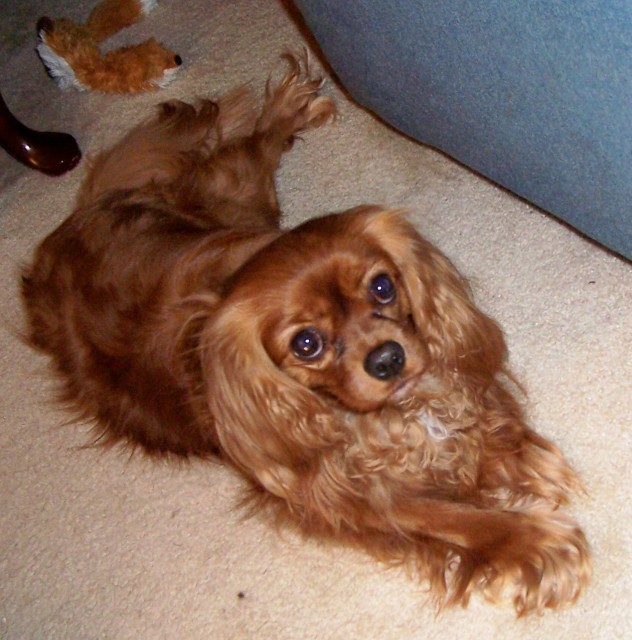 Dog light and shadow chasing
Question
Jenni
My 3 year old Cavalier King Charles Span
Dog light and shadow chasing
Question
Jenni
My 3 year old Cavalier King Charles Span
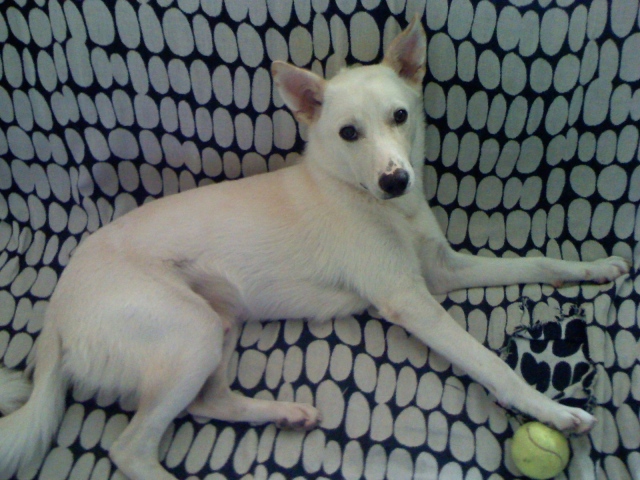 Dog walking problems
Question
Snickers
I have been trying to train my dog SN
Dog walking problems
Question
Snickers
I have been trying to train my dog SN
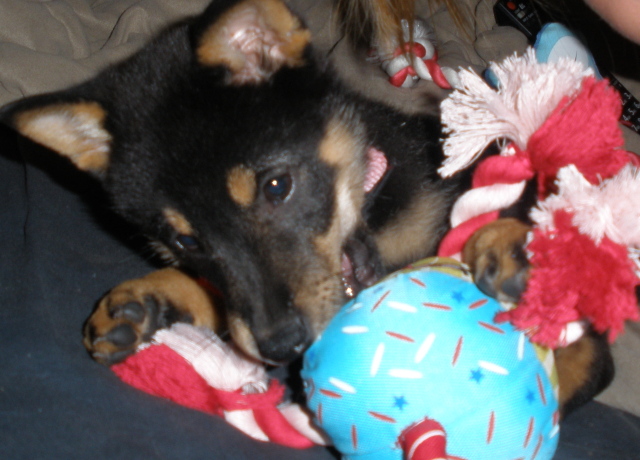 My Shiba Inu
Question
Lola
I bought a registered Shiba Inu puppy fro
My Shiba Inu
Question
Lola
I bought a registered Shiba Inu puppy fro
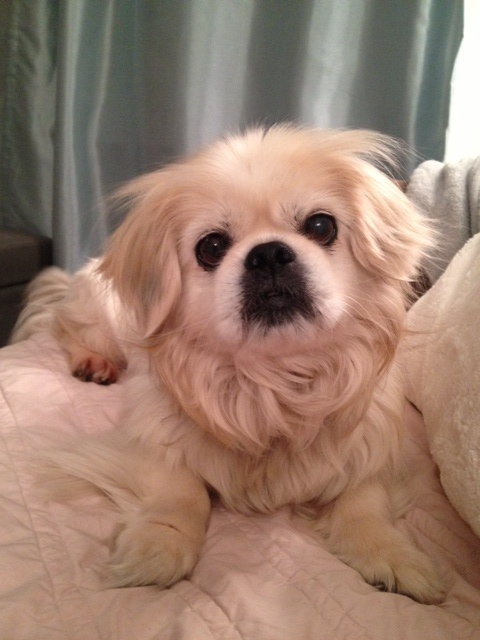 Nightmares?
Question
Beethoven
Hi Melissa, Ive had my very h
Nightmares?
Question
Beethoven
Hi Melissa, Ive had my very h
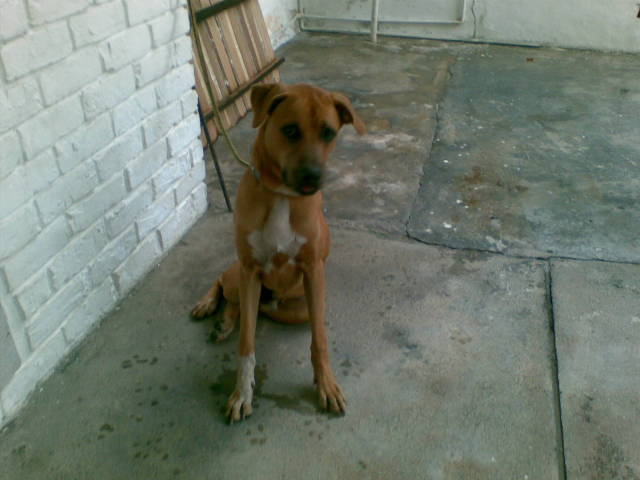 dogs behaviour
QuestionMy 8 months old Dusto
QUESTION: My puppy
dogs behaviour
QuestionMy 8 months old Dusto
QUESTION: My puppy